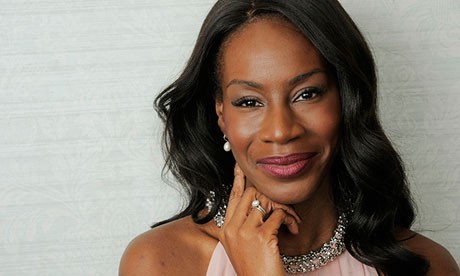Belle director Amma Asante
offered encouragement and advice to young women filmmakers at a
BAFTA Film Question Time event in London on Monday. Asante was one of four panellists — three
of them women — who came together to debate the most pressing issues facing the film
industry. Asante, Kate Muir (chief film critic for The Times), and Isabel Davis (Head of International at the British
Film Institute) were joined by producer Atif Ghani (Ill Manors, Anima State).
The
Film Question Time seems set to become a regular feature of the Academy’s BAFTA Guru programming, which is designed
to aid and inspire those hoping to break into the film and television
industries. As Asante told one young hopeful struggling to make it as a woman
director, the myth that being a woman “should be an advantage” in a
male-dominated industry remains just that.
The neophyte remarked, “I read a post on
social media recently which said, ‘Some women use [being a woman] to their favor:
Amma Asante is a great example of this.’ And I thought, ‘Wow… two films in ten
years, that’s a really great example.’”
Asante responded, “All I ever hear is, ‘You’re exactly the kind of person we want to work with.’ All of the five years
that I was trying to get my second film off the ground, I was hearing that — along with ‘… just not on this project.’”
For
Asante, succeeding in the industry and opening doors for other female
filmmakers require a combination of resolute self-belief and ruthless
optimism:
“I work in two
different ways. Sometimes I want to try and work out what the issues are so
that I can negotiate them, because I realize that I can only really change things
by example…. And other times I find I can’t even contemplate what the
challenges are, because if I do, I won’t even get up out of bed…. I’m about to
make my next film, and if I keep on telling myself that, eventually at some
point, it will happen. For me, it was ten years between the first and the second
film almost. I don’t have the answers; I just keep going.”
Asked what
advice she would give to a woman from an ethnic minority on breaking into film,
Asante answered:
“I’ve been asked by
financiers if I wear my high heels when I’m filming, and I’ve also been told to
look more pretty when the six o’clock news were sent to do an interview with me
on set during a rainstorm, when I was knee-high in mud. We’ve all got our
stuff, in a way, to deal with: whether it’s color, or religion, or you’re a
woman, or whatever. I just say, grow a thick skin and avoid those people who
don’t seriously want to know what it is you need or want to do as a creative.”
Critic
Kate Muir agreed that, to achieve success, a filmmaker has to be “utterly
ambitious” and push on doggedly no matter what. She cited Wadjda director Haifaa al-Mansour as an inspirational figure for
all women wanting to get their films made: “The first film ever
made in Saudi Arabia, made by a woman, and she just got out there and did it — and
it was illegal, impossible, improbable. And if she can do it, then we can all
do it.”
On the
issue of creating opportunities for women directors, Muir pointed the finger
not only at the major studios’ abysmal record on hiring women
directors,
but also at an identifiable reluctance to showcase women’s work on the festival
circuit. In her words, “Cannes is the real stinker in this case…. it
showcases the same old gents, marvelous as they are.”
The
evening wasn’t all doom and gloom, however. Muir was also very appreciative of Jane
Campion’s dedication to shining a spotlight on these
issues
as this year’s Cannes Jury President. Meanwhile, Isabel Davis was rightly proud
of the BFI Film Fund’s new diversity guidelines, reiterating that
not only the studios, but “the industry as a whole needs to take
responsibility.” She was optimistic that, in Britain at least, “everyone in
the public sector is probably aware [of the need to promote diversity], and of
the need to be quite proactive about how we encourage women to get directing.”
Amma Asante
is set to direct Unforgettable for Warner Bros. next, and she is one
role model whose success is undoubtedly already inspiring many young female
filmmakers to push ahead with their careers in the industry.
“I wanted to do a
studio film,” she said, “to show that, as a woman, I can.” Her final piece
of advice to those hoping to follow in her footsteps?
“Don’t take ‘no’ as a
full stop. Take it as a comma.”







